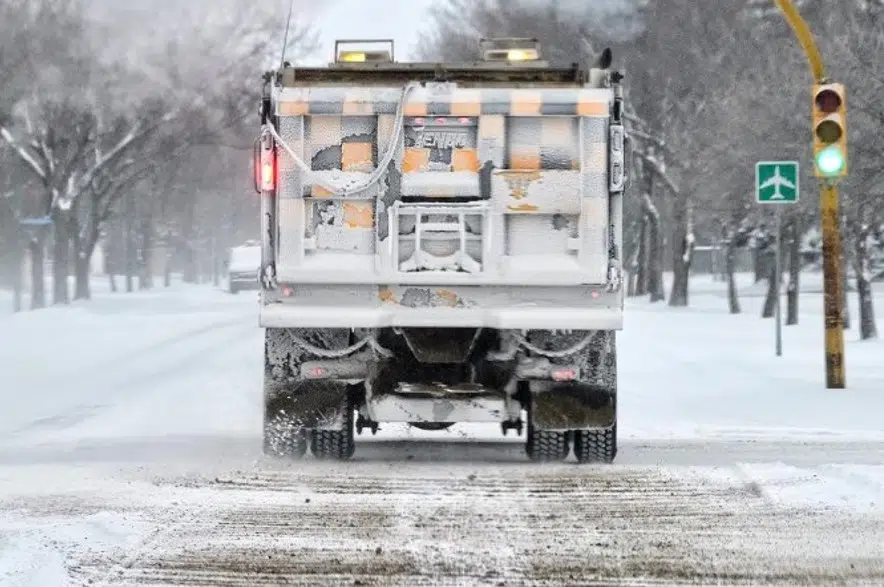It’s a relatively early start to the snow-clearing season, but City of Regina crews were ready to go Sunday morning when the snow really started flying.
“We had our equipment ready to be transitioned into winter needs. We had sanders available, we have equipment ready to plow snow, so when the snow did come, our crews were ready to address any needs that need to be taken care of,” Tyler Bien, the city’s manager of roadways seasonal operations, said Monday.
Bien said the city had multiple sanders available, but even had to transition a couple more on Sunday morning to take care of ice control on Ring Road.
The city got about eight to 10 centimetres of snow through the storm, according to Bien, and city crews focused on ice control on its categories 1 through 3 roads, with a particular focus on high-speed roads, high-volume roads and emergency roads.
Some drivers complained Monday that they hadn’t seen any city crews out on the roads, but Bien said they cycle through the roads on a regular basis.
“Just because they don’t see the sanders doesn’t mean they’re not there (or that) they haven’t passed relatively soon before or after (the drivers) were present,” said Bien.
Though the snow stopped by midday Monday, the melt can cause traffic problems, so Bien said crews would continue to provide ice control and plowing as needed, particularly on problem roads like those on the perimeter.
As of the first snowfall in the season, the City of Regina was already over budget.
Winter road maintenance was allocated $8.3 million in the budget for the year, but because the budget is done on a yearly basis and not by season, the end of the 2021-22 winter sucked up almost the entire year’s budget.
The current expense for that part of the budget so far this year is at $10.9 million.
“With the season we had last year, we are over budget at this point. However, we do have the winter reserve in place to allow us to provide any winter road maintenance needs that we need to provide for the residents,” said Bien.
Sidewalks
The city is also warning people about the sidewalk clearing bylaw.
Most properties in the city need to clear their sidewalks within 48 hours of a snowfall while some others — mostly commercial properties — need to clear theirs within 24 hours.
The expectation is for the sidewalk to be cleared to the edges and down as close to the pavement as possible to provide a “walkable surface.”
The Clean Property Bylaw will be enforced this year, which means if a property owner doesn’t clear their sidewalk, they’ll get a notice with a time frame. If the sidewalk is still not cleared, it will be done for them and the cost will be applied to their property taxes.
Provincial highways
Highways in and around Moose Jaw bore the worst of the winter storm Sunday.
“It’s certainly been a busy weekend for us. Our crews are working hard to try and keep up with a pretty aggressive storm. We’ve had some road closures (and) we’ve had some travel not recommended. Winter has arrived in Saskatchewan,” said David Horth, director of communications for Ministry of Highways.
Parts of the Trans-Canada Highway between Swift Current and west of Regina were closed for much of the day Monday. Horth said that happens when the ministry can’t guarantee safe passage for people because of things like visibility, road obstructions, and conditions that are considered hazardous.
Sometimes when conditions are bad enough, the ministry’s plows will also be taken off the road.
“If our crews can’t see, we take the plows off the road and that’s when visibility is less than 200 metres. It’s very difficult to work on a road that you can’t see and we have to be concerned about the safety of our people as well,” said Horth.
While the storm may have hit early in the season, Horth said the ministry is always ready for something like it.
“There’s only one month in the history of Saskatchewan that has never had snow fall, so our salt silos were all filled, our equipment was all tuned up and ready to go, blades had been conditioned on snowplows, and we had our crews distributed the way we always do,” he explained.
He said crews were out as soon as they could be when the snow started coming down.







